“Hypocrisy is the tribute that vice pays to virtue, dear man. In an imperfect world, I fear it’s the best we can manage.” — A Delicate Truth, John le Carré
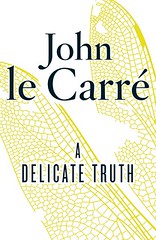 A Delicate Truth
A Delicate Truth
John le Carré
![]()
John le Carré is in his 80s and still writing spy thrillers that are as contemporary and up to the minute as anything else in the genre. His latest, A Delicate Truth, is one of his best IMHO.
Le Carré long ago moved on from the Cold War espionage era of his classic George Smiley character to the post-9/11, counter-terrorism, civilian contractor-dominated intelligence world of today, his later novels featuring mid-level actors in Britain’s foreign office and intelligence ministries. I will never say the George Smiley novels were unrealistic, because they all feel quite real … what I mean to say is that the later novels feel more real because they feature characters that seem like people we know.
You can feel le Carré’s anger with the direction covert intelligence-gathering has taken since the days when the Americans, led by Dick Cheney and George W. Bush, subverted and politicized the process, dragging Britain’s spy services down with them into a Keystone Kop mess of cherry picking intelligence from favored sources, running screaming after every imaginable threat, special rendition, torturing innocent and guilty suspects alike, and achieving failure after failure. Le Carré’s anger shines with a special intensity when he describes the yes-man atmosphere within Britain’s intelligence services today, and it shines with blinding intensity during the chapter where former foreign office official Kit Probyn tries to alert his former colleagues to a disastrously failed mission he was once part of.
Le Carré’s anger never gets in the way of his ability to tell a fascinating story. This novel is an absolute page-turner. The characters are vivid, deep, utterly believable. The botched intelligence operation, conducted in darkness at Gibralter, is as realistic as anything I’ve read. The conspiracy behind the operation, led by corrupt officials and politically influential outsiders, is revealed in layers, keeping the suspense at a high level throughout. If you are not as angry as John le Carré by the end of this novel, you are either Dick Cheney or an employee of Blackwater.
Damn, this is a fine, exciting, and thoughtful read. At the risk of repeating myself, it is one of le Carré’s best.
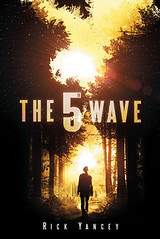 The 5th Wave
The 5th Wave
Rick Yancey
![]()
The 5th Wave hooked me from page one. I liked the plot, I liked the characters, I liked the writing. It has the right ingredients to become another Hunger Games. It reminded a bit of Hugh Howey’s Wool series, and also of Michael de Larrabeiti’s The Borribles, both of which I loved.
Yes. there’s a bit of teen romance woven into the storyline, but I liked Cassie enough that I went along with it. Hey, you have to have something to live for, something to fight the Others for, right?
I really liked the way Yancy shows rather than tells what’s going on with the rescuers from Wright Patterson. He doesn’t spell it out, but instead allows the reader and the novel’s main characters to figure it out for themselves as the plot unfolds.
Without getting into spoilers I will say that the storyline is extremely grim, involving the extinction of all but a few humans. Some will object to that, and I look forward to hearing about parental challenges to the inclusion of the book in school libraries and English reading lists. Why? Because I love banned books, and this one has the potential to make the list!
Seriously, I can’t imagine young adult readers not liking The 5th Wave and rushing out to buy sequels. I’m an old fart, and I’ll be in line too. The 5th Wave was a very pleasant surprise. More, please.
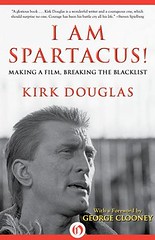 I Am Spartacus!: Making a Film, Breaking the Blacklist
I Am Spartacus!: Making a Film, Breaking the Blacklist
Kirk Douglas
![]()
This was one of my monthly book club selections. I was eager to read it because it promised an insider’s view of the Hollywood blacklist era, when many notable figures were driven out of the film industry in a national frenzy of witch hunting.
I was far less interested in Kirk Douglas himself, but my opinion changed as I read the book. I took it for granted that Douglas’ recollections would be self-serving, but the more I read the more I came to admire the actor/producer. His story is fascinating, and well-written to boot.
As to the Hollywood blacklist and Douglas’ role in making sure Dalton Trumbo appeared on the credits as screenwriter, thus “breaking” the blacklist, this subject comprises just a small section of the book, which is mostly about the struggles of making a film: finding financing, casting, getting the right director, and so forth. The parts about the squabbles and idiosyncrasies of famous actors were fun, and kept me turning pages to get to the parts about the blacklist.
Naturally, Douglas paints everything in the most positive colors. The gossip doesn’t sting; there’s little in the way of outing wastrels, drunks, philanderers, or complete shits (with the exception of the agent who systematically robbed Douglas for years, a story Douglas starts but regrettably doesn’t finish). Nor do I think he tells the whole story of the blacklist and the pressure he must have been under to dump Trumbo. But what he does reveal is fascinating, and helped me better understand the era.
Even more fascinating than the breaking of the blacklist, at least to me, was the censorship: Douglas recites a great long list of words, scenes, and sub-plots Universal Studios cut out of Spartacus before its release. I want to watch the movie again after reading this book, but more than anything I want to see the parts that were cut out! My admiration of Mr. Douglas went up a few notches after realizing the movie he made was a good deal richer and deeper than the movie Universal presented to the public.
Overall this is a fun and informative read, a nice supplement to more academic studies of the HUAC/Hollywood blacklist era.
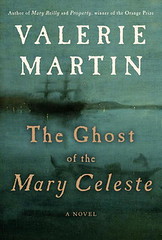 The Ghost of the Mary Celeste
The Ghost of the Mary Celeste
Valerie Martin
![]()
I had heard of the Mary Celeste but had never read anything about it. This fictional treatment appealed to me so I read it first, then researched the actual historical incident. Backwards, to be sure, but I believe fiction often tells a truer truth … good fiction, that is.
The parts of Valerie Martin’s novel dealing with the ship Mary Celeste and its crew and passengers are solidly founded in historical fact. The chapters detailing Arthur Conan Doyle’s writing about the Mary Celeste, along with the descriptions of his travels, seem accurate as well.
The parts of Martin’s novel that deal with the lives and inner thoughts of historical people are of course pure fiction, but extremely well done. One feels as if one has met and gotten to know the Mary Celeste’s captain and his wife, as well as the famous author-to-be Conan Doyle.
The parts of Martin’s novel that are wholly fictional (yet still based on events of the late 1800s in England and America) blend into the narrative so well that one has trouble separating those parts of the story from the more well-founded ones. I am speaking here of the spiritualist movement that swept the two countries during the Victorian era, and the character of Violet Petra, who astounds everyone who encounters her.
I’m as skeptical as they come: the dead do not communicate with the living. Yet I enjoyed this novel so much I temporarily put my disbelief aside. I will note that Valerie Martin adds her own strong note of skepticism in the character of the journalist who becomes Violet Petra’s friend, and this keeps the spiritualist parts of the novel from becoming romantic nonsense.
As for the mystery of the Mary Celeste itself: why the ship was found unmanned, its cargo still aboard, with no signs of violence or any other signs to suggest what may have happened to the crew and passengers? Martin stays close to historical facts here, yet leaves us wondering, and that wonder is what keeps the story of the Mary Celeste alive from generation to generation.
The Ghost of the Mary Celeste is solid, satisfying speculation about a fascinating historical mystery, and a very good novel as well.
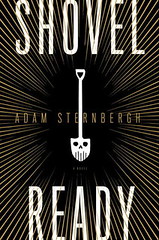 Shovel Ready
Shovel Ready
Adam Sternbergh
![]()
A near-future dystopian novel, written in classic hard-boiled detective style, about a contract killer working the mean streets of a mostly-abandoned post-dirty bomb New York City.
I absolutely loved it. Could not put it down. Even when, at the end, a multiplicity of double-crosses and feints made the plot a bit hard to follow.
In Sternbergh’s near future, wealthy people in great numbers have withdrawn from real life to live out fantasies in a detailed, realistic cyberworld called the limnosphere, opium addicts rewritten for the 21st century. Our man moves in and out of the limnosphere in a complex effort to protect a runaway girl from her pursuers, who chase her in both worlds as well.
Shovel Ready is so well written I didn’t mind the overdone stuff at the end, not even a little bit. The good guys are anti-hero types, exceptionally well drawn. The villains are truly evil, yet fleshed out almost as well as the good guys. The descriptions of the semi-deserted NYC are gritty and convincing.
I was enthralled. I had more fun with this book than I had any right to have, and have nothing but praise for Adam Sternbergh. Great stuff.
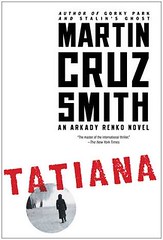 Tatiana
Tatiana
Martin Cruz Smith
![]()
Not the best Arkady Renko novel I’ve read. In fact it’s probably the worst. And yet it is still a solid three-star read. Here’s my review of Martin Cruz Smith’s previous Arkady Renko novel, Three Stations:
“Every time I read a Martin Cruz Smith novel, I marvel again over just how good he is. This one, the latest Arkady Renko novel, is the shortest one yet (under 200 pages). It’s fast-moving, not just because it’s short but because it’s tightly plotted. As with other Arkady Renko stories, it takes place against a backdrop of corrupt police, criminal oligarchs, and the poorest of the poor (who are not Dickens-style poor but barbarian wretches who’d rob their own mothers on their deathbeds). The familiar plot lines are here: Arkady is out of favor with his bosses, almost no one is willing to help him investigate a crime, Arkady plods on regardless of professional and personal danger. So is it cookie-cutter Renko? Maybe. But it’s so damn good you don’t care. Imagine an alternate universe where a one-hour police procedural on TV was actually good. Now imagine a universe where that one-hour police procedural on TV was ten times better than that. That approaches how good Three Stations is.”
From that you will correctly judge I’m partial to Martin Cruz Smith. Part of the reason I liked Tatiana, the latest Arkady Renko installment, is that I feel I know Arkady. I know him well enough to know how he’ll react to corruption, official blindness and lack of support, vicious criminals, and strong Russian women.
My main objection to Tatiana is the TV-style cop show ending, where all the villains and good guys are thrown together on the deck of a rusting oil tanker in Kaliningrad harbor and all the messy plot ends are resolved in a too-slick, too-easy manner. Yes, I was disappointed, but the parts of the novel leading up to the climax are quite good, and I was happy to see Arkady’s charge, Zhenko, growing up and finding his way in life.
I liked this novel because Arkady’s an old friend. Readers new to Martin Cruz Smith’s Arkady Renko novels should start at the beginning with Gorky Park and work their way forward; they’d probably be disappointed if they started with this one.